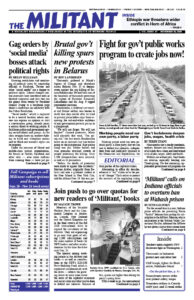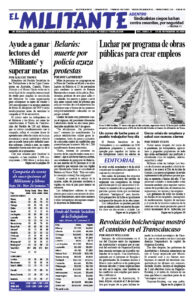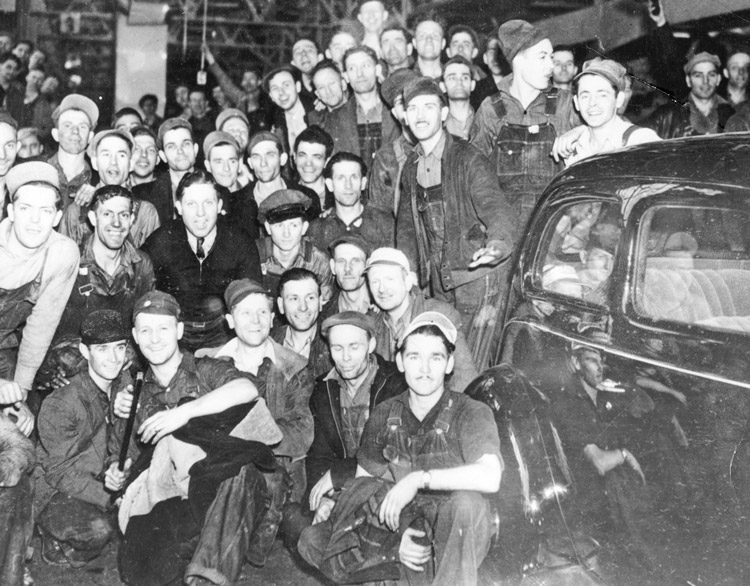The Transitional Program for Socialist Revolution by Leon Trotsky is one of Pathfinder’s Books of the Month for November. The excerpt below is from the document “The Death Agony of Capitalism and the Tasks of the Fourth International.” In drafting the document in 1938, Trotsky drew on the program and strategy of the first four congresses of the Communist International, led by V.I. Lenin and the Bolshevik Party in Russia. He also collaborated with the leadership of the Socialist Workers Party in preparing the resolution, which became the basic programmatic document of both the SWP and the world movement it helped lead. Copyright © 1977 by Pathfinder Press. Reprinted by permission.
The strategic task of the Fourth International lies not in reforming capitalism but in its overthrow. Its political aim is the conquest of power by the proletariat for the purpose of expropriating the bourgeoisie. However, the achievement of this strategic task is unthinkable without the most considered attention to all, even small and partial, questions of tactics. All sections of the proletariat — all its layers, occupations, and groups — should be drawn into the revolutionary movement. The present epoch is distinguished not because it frees the revolutionary party from day-to-day work but because it permits this work to be carried on indissolubly with the actual tasks of the revolution.
The Fourth International does not discard the program of the old “minimal” demands to the degree to which these have preserved at least part of their vital forcefulness. Indefatigably, it defends the democratic rights and social conquests of the workers. But it carries on this day-to-day work within the framework of the correct actual, that is, revolutionary, perspective. Insofar as the old partial, “minimal” demands of the masses clash with the destructive and degrading tendencies of decadent capitalism — and this occurs at each step — the Fourth International advances a system of transitional demands, the essence of which is contained in the fact that ever more openly and decisively they will be directed against the very foundations of the bourgeois regime. The old “minimal program” is superseded by the transitional program, the task of which lies in systematic mobilization of the masses for the proletarian revolution.
Under the conditions of disintegrating capitalism, the masses continue to live the impoverished life of the oppressed, threatened now more than at any other time with the danger of being cast into the pit of pauperism. They must defend their mouthful of bread, if they cannot increase or better it.
There is neither the need nor the opportunity to enumerate here those separate, partial demands which time and again arise on the basis of concrete circumstances — national, local, trade union. But two basic economic afflictions, in which is summarized the increasing absurdity of the capitalist system — that is, unemployment and high prices — demand generalized slogans and methods of struggle.
The Fourth International declares uncompromising war on the politics of the capitalists, which to a considerable degree, like the politics of their agents, the reformists, aims to place the whole burden of militarism, the crises, the disorganization of the monetary system, and all other scourges stemming from capitalism’s death agony upon the backs of the toilers. The Fourth International demands employment and decent living conditions for all.
Neither monetary inflation nor stabilization can serve as slogans for the proletariat, because these are but two ends of the same stick. Against a bounding rise in prices, which with the approach of war will assume an ever more unbridled character, one can fight only under the slogan of a sliding scale of wages. This means that collective agreements should assure an automatic rise in wages in relation to the increase in price of consumer goods.
Under the menace of its own disintegration, the proletariat cannot permit the transformation of an increasing section of the workers into chronically unemployed paupers, living off the crumbs of a disintegrating society. The right to employment is the only serious right left to the worker in a society based upon exploitation. This right today is being shorn from him at every step. Against unemployment, “structural” as well as “conjunctural,” the time is ripe to advance, along with the slogan of public works, the slogan of a sliding scale of working hours. Trade unions and other mass organizations should bind the workers and the unemployed together in the solidarity of mutual responsibility. On this basis all the work on hand would then be divided among all existing workers in accordance with how the extent of the working week is defined. The average wage of every worker remains the same as it was under the old working week. Wages, with a strictly guaranteed minimum, would follow the movement of prices. It is impossible to accept any other program for the present catastrophic period.
Property owners and their lawyers will prove the “unrealizability” of these demands. Smaller, especially ruined capitalists in addition will refer to their account ledgers.
The workers categorically denounce such conclusions and references. The question is not one of a “normal” collision between opposing material interests. The question is one of guarding the proletariat from decay, demoralization, and ruin. The question is one of life or death of the only creative and progressive class, and by that token of the future of mankind. If capitalism is incapable of satisfying the demands inevitably arising from the calamities generated by itself, then let it perish. “Realizability” or “unrealizability” is in the given instance a question of the relationship of forces, which can be decided only by the struggle. By means of this struggle, no matter what its immediate practical successes may be, the workers will best come to understand the necessity of liquidating capitalist slavery.


